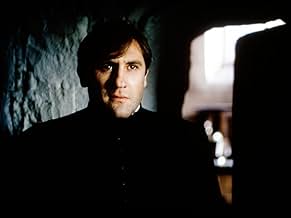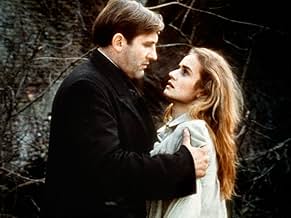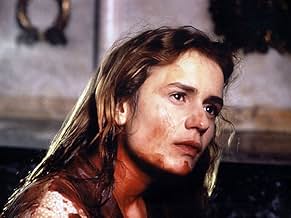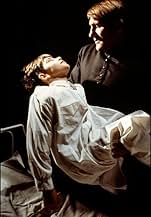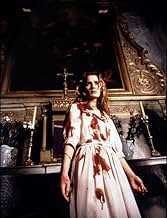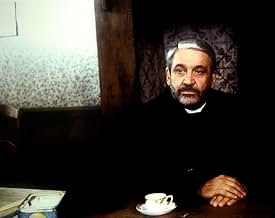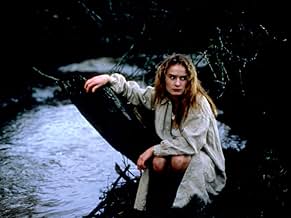Adicionar um enredo no seu idiomaA priest stuck in a rural congregation and burdened with his overwrought spirituality, finds purpose in a troubled woman accused of murder.A priest stuck in a rural congregation and burdened with his overwrought spirituality, finds purpose in a troubled woman accused of murder.A priest stuck in a rural congregation and burdened with his overwrought spirituality, finds purpose in a troubled woman accused of murder.
- Direção
- Roteiristas
- Artistas
- Prêmios
- 2 vitórias e 7 indicações no total
- Havret
- (as Pierre d'Hoffelize)
- Mr. et Mme de Wamin
- (as Bernard et Yolande de Gouy)
- Mr. et Mme de Wamin
- (as Bernard et Yolande de Gouy)
- Direção
- Roteiristas
- Elenco e equipe completos
- Produção, bilheteria e muito mais no IMDbPro
Avaliações em destaque
We see nothing of the parochial trials, and sickness, endured by Bernanos' Curé de campagne (Robert Bresson's film), faced with hostility and mockery from his villagers. The two traumatic events (Mouchette cutting her throat, and a dying boy "coming to life" in the priest's arms) shock us, but do not form an integral part of the curate's spiritual day-to-day experience. They are merely sensational. Depardieu is not convincing as an agonised believer. Yet, in the spontaneous sincerity of his accompanying interview, he appears to draw inspiration from Augustine!
From this basic premise the film can be explored from several key standpoints to obtain real insights into subjects such as the power/source of faith, the relationship between thought/belief and one's relationship to the world we inhabit.
Moreover, the questioning employed by Pialat and Depardieu means that the path of thought through these issues is profound, intense and disturbing. The film provokes the intellect constantly and I could understand that if there was nothing more to the film, one might say that "is that it?"
What takes this film much further is the emotional undercurrent - both understated and abyssal, the stunning cinematography and restrained direction. These factors combine to create a complete cinematic experience.
One scene stands out in this respect: we watch the priest wander the countryside in a daze and he pauses on the side of a hill, lush with spring grass. Depardieu looks up, eyes searching for insight, an answer, a response. In a brilliant stroke of luck, passing clouds obscure the sun and Depardieu instinctively internalises this shifting light with a simultaneous passing of emotion portrayed through his face and posture. We watch both the internal shifting cloud of emotion and the changing light create a charge and intensity that is rarely seen in cinema. There is an element of the `unknowable' in this scene that still moves me, even after many viewings.
I also enjoy making comparison between this film and Dreyer's "Das Wort" (The Word), my favourite of Dreyer's works which has some common theme's, explored from different perspectives.
A truly great film, worthy of the Palme D'or it won.
Someone makes a point about Bonnaire being no "attractive" lass and here i have to agree ( she's not "ugly", yet not attractive as well). The point, however, is that (see the other Pialat's movie "à nos amours" where Bonnaire stars again ) that proves the director's dedication to portraying "real" people within reasonable circumstances, without Hollywood gimmicks and porn stars wanna-be's eager to show some skin ( i always think: skin is OK, but then got for true porn).
I can also guess translations & adaptations may have resulted in a mess.
Você sabia?
- CuriosidadesWhen the movie was announced as the winner of the Palme d'Or at the Cannes Film Festival, with the jury declaring that it was an unanimous vote, the audience, who expected Asas do Desejo (1987) to win, booed when the director Maurice Pialat was on his way to the stage to receive the award. Pialat's response to this was to raise his fist, replying: "If you don't like me, I don't like you either".
- Citações
[first lines]
Donissan: With you, everything looks easy. Alone, I'm useless. I'm like the zero, only useful next to other numbers. Priests are so miserable. They waste their lives seeing God being ignored. People make jokes on us. We're like those walls where people write obscenities.
Menou-Segrais: You're tired.
Donissan: Tired? I'm not tired. Tired is a bad thought.
Menou-Segrais: Suspend your visits.
Donissan: Those visits do more harm than good. In the beginning, I didn't know evil. I learned it from the mouths of the sinners.
Menou-Segrais: No one knows better than a priest about the terrible monotony of sin.
Donissan: I can't speak to them. I can't only make absolutions and feel sorry.
Menou-Segrais: If one absolution in thirty was worthy, the world would be brief.
- ConexõesFeatured in As Cento e uma Noites (1995)
Principais escolhas
- How long is Under the Sun of Satan?Fornecido pela Alexa
Detalhes
- Data de lançamento
- País de origem
- Centrais de atendimento oficiais
- Idioma
- Também conhecido como
- Under the Sun of Satan
- Locações de filme
- Empresas de produção
- Consulte mais créditos da empresa na IMDbPro
Bilheteria
- Faturamento bruto nos EUA e Canadá
- US$ 68.765
- Fim de semana de estreia nos EUA e Canadá
- US$ 6.987
- 22 de jan. de 1989
- Faturamento bruto mundial
- US$ 69.688
Contribua para esta página


![Assistir a Trailer [English SUB]](https://m.media-amazon.com/images/M/MV5BZDhmMWVjNGItMWM0NC00NmUzLTk5NmQtNDM4NjBjM2JjNjJmXkEyXkFqcGdeQXRyYW5zY29kZS13b3JrZmxvdw@@._V1_QL75_UX500_CR0)
